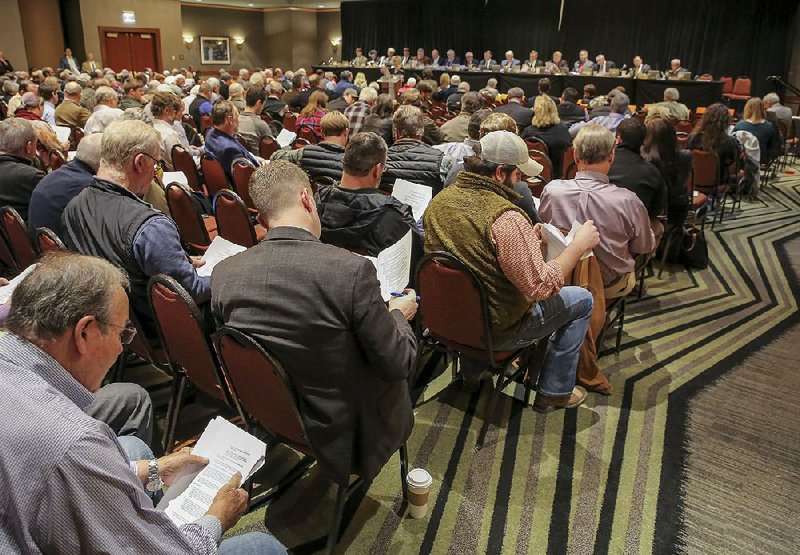The state Plant Board on Wednesday levied $105,000 in fines against a Missouri farmer for violating Arkansas herbicide law, including spraying dicamba last year during the state's ban on the chemical.
The farmer, Jeffrey Todd of Clarkton, Mo., didn't attend the hearing or send an attorney to represent him, but can appeal the Plant Board's decision to any circuit court in Arkansas. He couldn't be reached for comment Wednesday.
The board had two separate case files against Todd -- one for five violations in June 2018 and another for six violations about two months later. Both involved applications of dicamba on a field farmed by Todd east of Piggott, near the Arkansas-Missouri border.
Between the two cases, the board levied $25,000 fines for each of four violations: two counts of spraying dicamba in a way that caused it to move off target, and two counts of causing "significant" damage to other crops. It was the first time for the board to issue maximum fines of $25,000 for "egregious" violations as set by the General Assembly in 2017. The previous maximum fine was $1,000.
The board also levied $1,000 fines on Todd for five other violations: two counts of failing to provide spray-application records and one count each of failure to keep those records, not showing that he underwent special online training in Arkansas in 2018 to spray dicamba and for lacking a license to spray herbicides in Arkansas.
During the past three years, the board has been inundated with complaints about dicamba damage to crops and other vegetation that aren't tolerant of the herbicide. The board received 1,014 complaints in 2017, 200 in 2018, and 209 as of Sept. 30 this year.
Plant Board members have been frustrated by evidence that they believe shows that some farmers have purposely ignored cutoff dates on using dicamba, such as the April 15 ban for 2018. This year's cutoff date was May 26. Some members have argued that the only way to get farmers' attention is to levy the $25,000 fines.
The board spent nearly four hours debating the two cases during a formal hearing that required the presence of a court reporter to take a full record of the proceedings and a hearing officer from the attorney general's office to preside over the meeting.
Todd never contacted the board during the 16 months since the first of the two investigations began and had minimal contact with the state inspector who first saw signs of illegal dicamba use on the land that Todd farms, according to testimony and evidence submitted Wednesday.
Michael Greenway, a field inspector, said he first noticed signs of dicamba use and damage around Todd's fields in June 2018. Greenway said he found evidence of dicamba damage on 80 acres of soybeans just north of where Todd had sprayed. Greenway testified that he got in contact with Todd, who initially denied that anything had been sprayed on the field. Greenway said Todd later admitted that dicamba and Roundup had been used.
Similar symptoms and damage were found in August 2018, indicating dicamba had been sprayed again, Greenway said. Todd, again, wasn't cooperative about providing records, Greenway said.
While Plant Board staff correspondence to Todd indicated total possible fines of $59,000, Wade Hodge, the attorney for the Arkansas Department of Agriculture, said the board had much more leeway to levy even higher fines.
Once the board determined that off-target movement of dicamba had occurred and had caused "significant" damage to amount to an egregious violation, the board could extend the $25,000 fines to the record-keeping violations and the lack of a training certificate, Hodge said.
Such actions could have elevated the total possible fines for the 11 violations to $225,000.
Hodge said the board is not required by law to find any specific dollar amount of damage to crops in determining whether a violation is egregious.
While largely unanimous in deciding that the off-target drift of the herbicide and post-ban spraying were egregious offenses, the board splintered on whether the other offenses constituted major violations that warranted $25,000 fines.
Terry Fuller, a board member who represents the Arkansas Seed Growers Association, said not levying stiffer fines on the other violations devalues the state law that requires that such records be kept and be provided to state inspectors upon request.
Arkansas in 2018 also required dicamba applicators to be certified through an online program set up by the University of Arkansas System Division of Agriculture. There was no evidence that Todd took that training, the board was told Wednesday.
Fuller, Jerry Hyde of Paragould, John Fricke of Pine Bluff and five other board members said the failure, in Todd's case, to have that certification should be grounds for a $25,000 fine and that such training might have prevented any errant spraying. Three members -- Tommy Anderson, Sam Stuckey and Barry Walls -- voted against that effort, which was enough to doom it, but voted for the $1,000 penalty.
Another case deemed eligible for the $25,000 in fines that originally was scheduled to be heard today has been postponed at the request of the farmer, Jimmy McDonald of Marked Tree. It will be rescheduled, according to the Agriculture Department.
A Section on 10/24/2019
